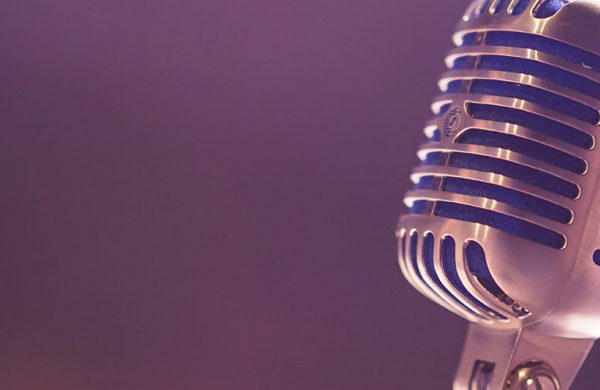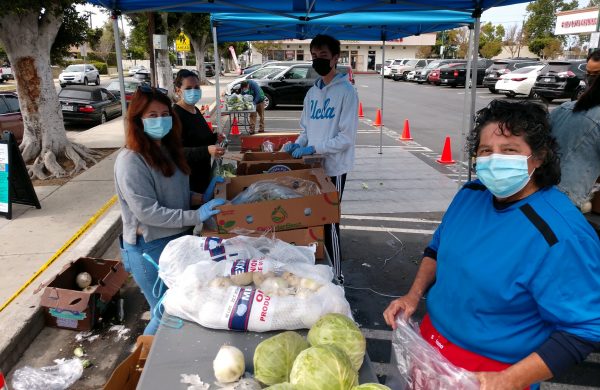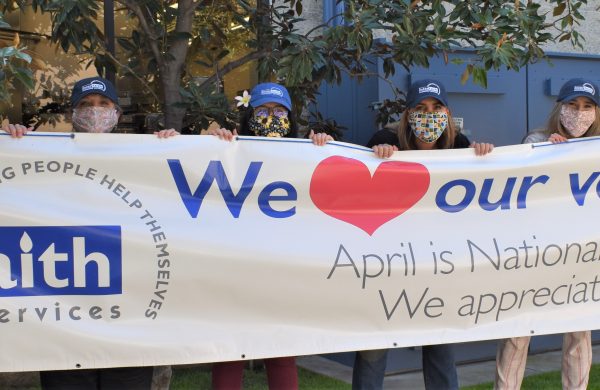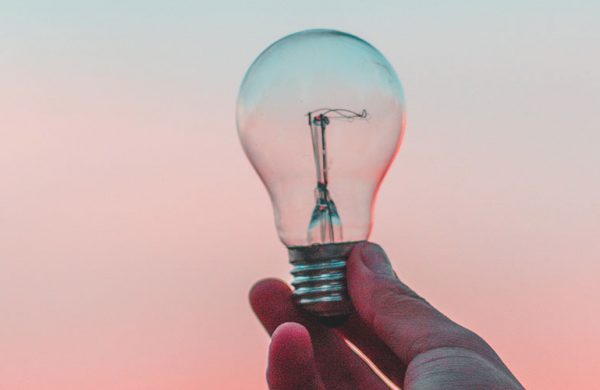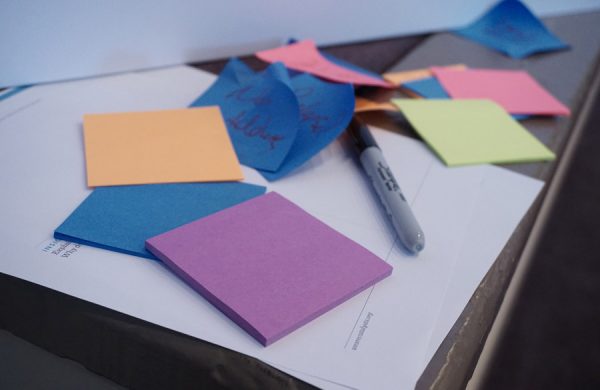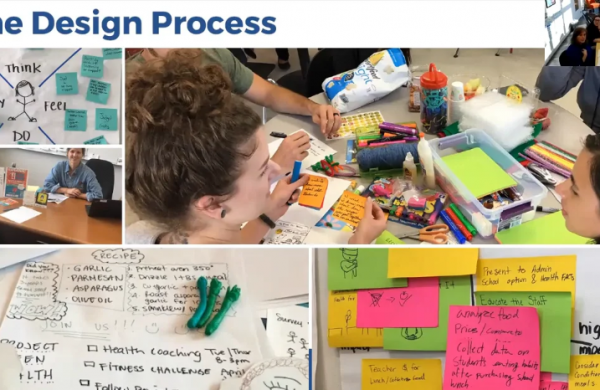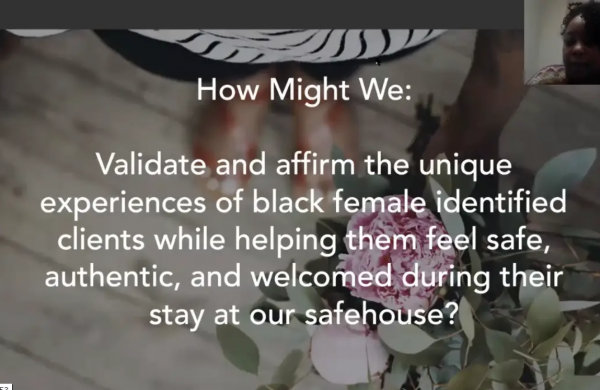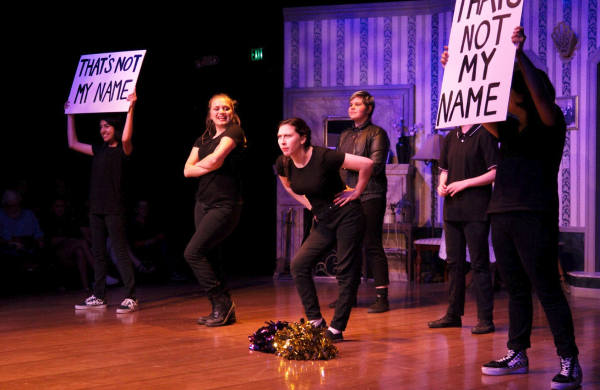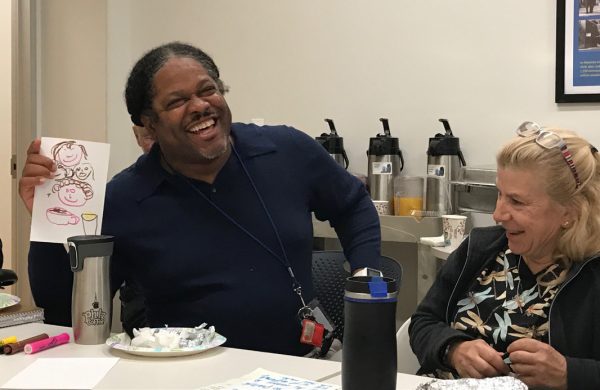We've been talking a lot about "design thinking" on this podcast lately.
Now, it's your chance to get involved in Catalyst, our award-winning training program that teaches an approach to problem solving that is rooted in understanding people’s needs and experiences. Learn about the application process, building new mindsets, and how you can contribute to the future of community health.
Listen and subscribe to our podcast on Apple Podcasts, Spotify, and elsewhere. Below is a transcript of the episode, edited for readability.Weslei Gabrillo: We've been talking a lot about design thinking on the Health Pilots podcast lately. Now, it's your chance to get involved in the CCI program. Today, we're talking about an opportunity to be a part of Catalyst, our award-winning design thinking program. The applications period opens on October 6th and the deadline is Friday, November 19th to become part of the next cohort. I'm Weslei Gabrillo, with the Center for Care Innovations, facilitating the conversation today with my colleague here at CCI, the Catalyst program manager, Kathleen Figoni. Kathleen, hi. Kathleen Figoni: Hey Wes, thanks for having me. I'm so excited to be here. So I'm Kathleen Figoni and my preferred pronouns are she/her/hers, and I'm so incredibly proud of the work that I do here at the Center for Care Innovations. As a program manager, I really have the opportunity to strengthen the health and well-being of historically under-invested communities by really leading initiatives that build capacity through human-centered design, multi-sector partnerships, and care delivery transformation. And I lead a range of these programs in CCI's focus areas and I am so proud to be talking with you today around our award-winning Catalyst program. Thanks again for having me Wes. Weslei Gabrillo: Thank you for sharing your story Kathleen, as you know, I was actually a participant in the Catalyst program earlier this year, in 2021. I myself had no experience working in human-centered design, or HCD, nor any design for that matter, but not only was participating in the program with my team an enriching and very applicable experience to my work at CCI, supporting the safety net and health centers, I feel on a professional and personal level it's overall has helped me deepen my mindsets around collaboration and approaches to problem solving. But Kathleen how about we also get into your experience coming from being a participant in Catalyst, to a coach and to now managing the program as well as co-leading the content facilitation. Kathleen Figoni: Yeah, it's an interesting story, one of course that I'm incredibly proud of. But I guess where should I start. Back in 2014 when I was coming out of grad school, I had big dreams of really becoming a quality improvement director. And so this program really kind of helped shaped my career trajectory. When I got out of grad school, I started working as a data entry specialist at a local federally qualified health center, in FQHC. And I remember actually manually calculating the DAC clinical dashboards, that was obviously before Tableau existed, which I'm jealous by the way, because that's an amazing tool, but I actually vividly remember my medical director coming up to me and saying, "Hey Kathleen, there's this really cool program that the Center for Care innovation is putting on around human-centered design." And at that time that particular FQHC we were building our innovative culture. Kathleen Figoni: And we knew that we needed to build our mindsets. We needed to have tools in our back pocket and this program, reading the request for application, really kind of showed us that we needed to apply, it with something really exciting. And it had already been in the works for a year, this program launched in 2013. So we knew that we already had like a colleague that went through it and they raved about it, right? And so I just was saying, "oh my gosh, I, I do, yes. I would love to go through that program". And really as I mentioned, it just kind of changed my career trajectory. Taking a step back, really understanding the problem, and going out and interviewing people, and making things tangible that was different, I always was creative in my work. Kathleen Figoni: I guess personally, but being able to bring that into the healthcare space was new and exciting. And I went from, as Wes you mentioned, I went from basically a data entry specialist to managing the innovation program at this FQHC, and I feel very fortunate that CCI kept asking me to come back and coach, and now I have the pleasure of leading this program and managing it. So I am incredibly honored to be here and I know what it's like to be a participant at the end of the day, so yeah. Weslei Gabrillo: Kathleen, that's amazing to hear that, through even your learning experience and journey through human-centered design thinking, and specifically with Catalysts speaks to your journey and your work today here at CCI, but also for supporting the health centers and the safety of the community. Taking a step back, firstly, there are many ways to define design thinking and sometimes we might even need to be demystified. In your own words, what is design thinking? Kathleen Figoni: Yeah, well thanks Wes. I think human-centered design really is an approach to problem solving that's rooted in understand people's needs and experiences, and it really requires that people get comfortable deepening their understanding of the problem before we're actually jumping to solutions. Weslei Gabrillo: You know, I know that resonates for me because in group work and processes, jumping directly to solutions is sort of like the way we think things should be working or immediately brainstorming for solutions. Going through Catalyst, I learned it really begins with taking that step back and really understanding the problem itself. Kathleen Figoni: Yeah, you hit that nail on the head, Wes. One of the first things that we teach our Catalysts is that to truly understand the depth and complexity of the problem that you're trying to solve for, you must first go to those experiencing the problem and listen to how they're actually interacting with it, right. And in doing so, this really helps our teams ensure that they're working on the right problem, right? Weslei Gabrillo: Wow. You know, my team going through Catalyst, we continually found ourselves going in one direction based on what we believe to be our initial problem was, but through even the interview phase, for instance, of the Catalyst process, we saw really quickly that our problem statement needed to be shifted. So conducting the interviews to understand people's actual experience, we as a team discovered that we needed to reframe our problem and it became even for our team that much more clear to address. Kathleen Figoni: Yeah. That happens so much, I've seen almost every team. They come in thinking that they're going to solve one problem and after going out and listening, they pivot and they shift, and they're focusing on something else and they're bringing those people along the way that they interviewed and talked to, to co-design with them. I think that's amazing and one of the beautiful things that sometimes we forget to do, right? Weslei Gabrillo: Yeah. And it just really enlivens the experience of continuing to refine what the problem is, hearing people's experiences, and even learning some of those ways to approach conducting interviews. We don't often lead with empathy, but that was one particular nugget from my Catalyst program experience that I know I'll take with me. Shifting gears, what also struck me going through this program was the focus on power dynamics. Can you speak more to how Catalyst centers equity? Kathleen Figoni: Yeah. Thank you for mentioning that Wes. In our Catalyst program, we focus on advancing equity by exploring power dynamics, leading with humility, and we really emphasize that practice of community co-design where those, again, that are most effected by the problem, whether they are patient, caregiver, client, even just community members, right, staff. They play a pivotal role in decision-making and the creation of solutions, so it is incredibly important to talk about power dynamics. Even at the team level, right? How are those on the team interacting, right? And so we start first with that conversation, which can be uncomfortable, but incredibly necessary. Weslei Gabrillo: Now, Kathleen, transitioning to the program itself, what will participants learn in Catalyst? Kathleen Figoni: That's a great question. As a Catalyst, you will become a change agent in your organization. You'll discover and test new ways to address challenges. You're going to get to partner with your colleagues that you probably don't normally get to across the organization. And you're going to partner with and collaborate really with your diverse stakeholders in your community. That's incredibly fun to do and go out and listen and talk to them and bring them on this journey with you to co-create the solution. You're also going to just develop expansive mindsets. You're going to combine creative and analytical kind of design methods to really push your project beyond conventional thinking to transformative possibilities. And I will mention too, you are going to have fun along the way. This is one of my favorite communities. We have so much fun together just trying, testing and co-creating together. Kathleen Figoni: The fun aspect of it is definitely true, Kathleen. Working with our team, we met on a weekly basis outside of the weekly work sessions with Catalyst and my team I worked with, the folks I work with here at CCI, who I are definitely my coworkers, but often times I don't work with them daily with the program work that I've done traditionally. So meeting weekly in this space, really using the methodologies from the Catalyst Program to apply to our project, I mean, for me, one of the methodologies, or mindsets rather, is leading with empathy. As I mentioned earlier, conducting that interview process, I hadn't known to lead interviews in that way. Weslei Gabrillo: Usually it's just question and answer, but it allowed us to really sit back and know, okay, tell me more using these phrases that we can really dig deeper into the experiences that we're asking of our interviewees and taking that back to the team, using another collaborative cycle to see how might we reframe our problem and using those methods to really shape what problem we're addressing. So that's something that I think has stuck with me and their approach to my work day to day. Kathleen Figoni: Yeah. And I don't know about you to Wes, but do you use these methods personally as well? Because I definitely do. Weslei Gabrillo: Kathleen, I'm beginning to see that, really, the way I approach a problem. Maybe I don't go through the whole thing, but differently. Yes. Knowing with the awareness that, oh, this is different. I'm approaching this differently than I would have previously. Kathleen Figoni: Yeah. And you know what, too, just fun fact, when I was planning my wedding a few years ago, me and my husband, we did some affinity clustering, and we really decided what was important to us? What did we want our experience? What do we want that day to look like for us? So he was like, music and food was important to him and of course, the flowers and music too. So we knew that, well, we both identified music. We're going to definitely invest some of our time here. And we journey mapped what the experience was going to look like for our guests and it was actually really fun to do, to take these Catalyst mindsets and methods and apply it personally. I loved it. Weslei Gabrillo: That's amazing. I know we, with CCI, we did independent Catalyst, but using the same design thinking mindsets of... We used an example in my recent history of when I moved to the current home I live in and really doing design dash. Kathleen Figoni: Oh yeah. Weslei Gabrillo: Yeah. About brainstorming around those and quickly prototyping using stickies or other modalities of just prototyping something and putting it out there. And we worked virtually, so I remember our team in Catalyst, we still wanted to use stickies, but with our collaboration tool, took a picture of it and then put it on our mural board or Miro board. And that was a great way to just sort of really bridge the idea of hey, we're still making things tangible and at the same time, really prototyping and testing out ideas in our different solution directions. Kathleen Figoni: I love that, Wes. Weslei Gabrillo: So shifting a bit here, how does design thinking contribute to the future of community health? Kathleen Figoni: Well, this year's Catalyst Program, it will again be a hundred percent virtual and we're really actually going to apply design thinking to support the recovery and renewal of our communities. For the first time we have that focus area and the COVID-19 pandemic continues to impact all social determinants of health and it really requires us to get creative, develop, understanding, and awareness, and ultimately we're doing that so we can transform the way we retain and sustain community health and wellbeing. So definitely going to be fun to tackle that particular area. Weslei Gabrillo: What's really interesting, Kathleen, is that I remember many organizations this last year, having to pivot and change their project topics in order to really support their community's needs, even more so wellbeing, during the pandemic. Actually, there was this one project that I was really impressed by, which I saw in our final Catalyst showcase. Kathleen Figoni: Which one? Weslei Gabrillo: Yeah, well, they truly exemplified how it is to partner across even different sectors. The Catalyst team was a multi-sector partnership in Los Angeles that involved Venice Health Clinic and the community-based organization, Food Forward. It was this idea around prescribing food as medicine. I recall the teams hoped to use their time in the Catalyst Program to launch a food distribution event at the clinic and create a toolkit for other clinics in LA and across the state of California that they could use to address food security. And I remember from the start, they had envisioned this event that would bring together food distribution to meet people's immediate and long-term needs food needs. Kathleen Figoni: Yeah, I remember that. I was so incredibly impressed by that project. It was so powerful to just see them pivot, adapt and with the COVID-19 pandemic, shift to meet the needs of the community and meet them where they were at. You know what was also really interesting about that partnership too was I feel like that the pandemic actually really indirectly improved partnerships like that one. And I say that because organizations now have the infrastructure to support virtual work. And I remember myself being in clinic and working with external organizations to solve problems and collaborate with one another. I was constantly stressing. I have to make sure I'm driving there and time management and where are we going to meet? And I watched this partnership actually bloom in this virtual programming. The coordination and the collaboration was just really a lot easier for them because this program was virtual. Weslei Gabrillo: So as we see, one of the ways of which the pandemic has indirectly improved partnerships and there's beginning to be this place of infrastructure to really support virtual work for organizations across different sectors. With the longstanding history of Catalyst since 2013 and how we see it moving forward, what do you see just as a legacy, the legacy of Catalyst? Kathleen Figoni: Yeah. I'm so proud of this program. We've trained 338 Catalysts. We've touched 92 different organizations across five states. And one of the most impactful stats for me is that we have 25 past Catalysts that have become coaches. Now that really shows to me that organizations truly invest in the innovative culture. They want to know and bring these past Catalysts back so that they can learn and teach these methods to others. I think this program is thriving and it truly is cultivating a community of innovators who are using design thinking to co-create the future of community health. It's incredible. Weslei Gabrillo: Thank you, Kathleen. So as we wrap, if you could just remind us again, the deadline for this upcoming Catalyst Program, and maybe once again, some of the things you're looking for, for the teams that are applying. Kathleen Figoni: Yeah. Thanks, Wes. So we are looking for 15 nonprofit organizations in California that are providing social services to historically under-invested communities and, or we're also looking for multi-sector partnerships, that one that we just talked about where there was a health center and a community based organization. We encourage those partnerships to apply as well. So if you're interested, I really encourage you to apply or better yet, we're having this informational webinar on October 20th. We're going to explain more about the program details, expectations, eligibility and of course, we'll have time to answer any and all questions that you have. But again, the request for application goes live on October 6th and the deadline for the application to apply is Friday, November 19th at 5:00 PM. But thank you so much, Wes, for having me today. I loved chatting with you. Weslei Gabrillo: Of course. Likewise, Kathleen. This is great that we can continue to promote the amazing longstanding work of the Catalyst Program and the folks who have gone through it and hopefully, new folks and teams to continue this work moving forward. So thank you again. And once again, for all, this has been the Health Pilots podcast. Visit care innovations.org for more information and we'll catch you in the next one.

